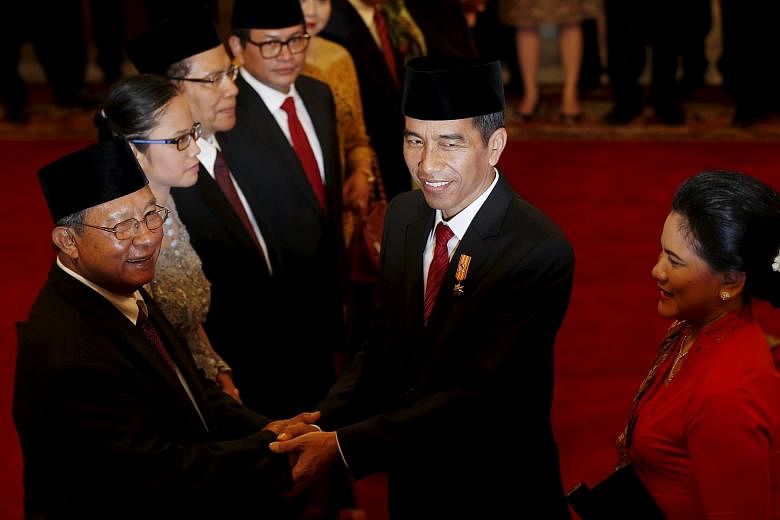(THE JAKARTA POST/ASIA NEWS NETWORK) - Driven by the slow progress in the last nine months, especially with regard to socioeconomic matters, President Joko "Jokowi" Widodo finally reshuffled his Cabinet Wednesday. But will it be enough?
When campaign promises finally meet complex realities, things can get uncertain. The challenges of our socioeconomic development are not as simple as campaign slogans; they are quite complex and more serious.
To understand our current economic challenge, one has to look at our development in the last three decades.
In the New Order era, the national development strategy was based on industrialisation with strong support from the agricultural sector. While the strategy was sound, the financial crisis in the latter part of the 1990s exposed that the industrialisation never stood on strong footing.
If five years after the crisis was a period of transition, with its main priority rescuing the national economy, post-2004 was the right momentum to lay the foundation for solid medium-term and long-term developments.
Alas, in the 10 years of Susilo Bambang Yudhoyono's government, which preceded the current administration, the opportunities were wasted.
The situation is complicated by the remarkable penetration of China and Vietnam in the global market, coupled with the significant growth of electronic industries in Malaysia and Thailand.
This creates a huge problem for our domestic textile, electronics and other main manufacturing industries, which were once expected to absorb our abundant labor and accumulate foreign exchange reserves.
For instance, based on data from the World Trade Organization (WTO), over the period of 1995 through 2013, the value of our exports of textiles and clothing only doubled, reaching around US$12 billion in 2013, while China experienced a drastic sevenfold surge to reach US$284 billion (S$398.8 billion) in 2013.
Vietnam succeeded in raising the value of its exports of textiles and finished garments by fourteen fold, up from about $1.5 billion in 1997 to $22 billion in 2013.
Meanwhile, our electronics industry could not compete with that of Malaysia and Thailand. For example, the export values of electronic devices and office equipment of Malaysia and Thailand in 2013 were $51 billion and $26 billion, respectively, far surpassing that of Indonesia, which was only $2.8 billion.
So far, with its share of 23 percent of the country's total exports in 2013, Indonesia still relies on agricultural products whose demand is fairly elastic and prices are fluctuating in the world market.
With the total value of our exports standing at $183 billion in 2013, far below those of Malaysia and Thailand, which enjoyed $228 billion and $250 billion in export values, respectively, our issue seems to be beyond just numbers.
To be sure, how much a nation is exporting its commodities is not an exclusive indicator of the nation's economic success or failure.
However, the low performance and lack of our exports beyond primary commodities not only shows slow progress of our industrialisation but is also a portrait of overall national economic development that suffers from poor planning and deficient commitment. A case in point is the ever slow development of vital sectors such as energy and infrastructure.
The country's highly inadequate infrastructure has been a more than two decades long issue, yet it has never been tackled seriously.
If the rule of thumb for infrastructure financing requires at least 5 percent of gross domestic product (GDP), the infrastructure spending in the state budget in 2014 only reached 1.7 percent of GDP. Meanwhile, India has spent above 7 percent of its GDP on infrastructure since 2009 and China's infrastructure spending has been 9 to 11 percent of its GDP since 2005.
Fundamental challenges require bold and fundamental answers.
Likewise, complex challenges demand systematic and well-planned solutions.
Hence, the Cabinet reshuffle will be of little benefit if the following fundamental questions are not answered clearly: Under what sectors should Indonesia's economic development be built and promoted? What are the strategic measures that need to be undertaken to achieve short-term, medium-term, and long-term targets?
Moreover, what are the national commitments needed to realise those targets? What are their implications for employment, investment, human resource development, infrastructure development, energy and tax reform, as well as social areas? What are the strategic steps that must be taken to mobilize the financing of development? How do we strategically increase the efficiency in financing of our development programs?
In other words, what is the blueprint of our development and what are the most strategic national commitments, and perhaps, sacrifices, for its successful execution?
One may argue that with the country's moderate growth rates in the last 10 years, our economy is actually on the right track and its fundamentals are sound. But the same argument can be made about our experience in the decade before the economic crisis in 1997.
It would be very disappointing if the reshuffle is used to accommodate certain political interests at the nation's expense.
Equally disappointing is if the reshuffle ends up taking the same approach and yet expects a different result. To quote Einstein, that's called "insanity."
* The writer is a professor of economics at Azusa Pacific University, California, US.

